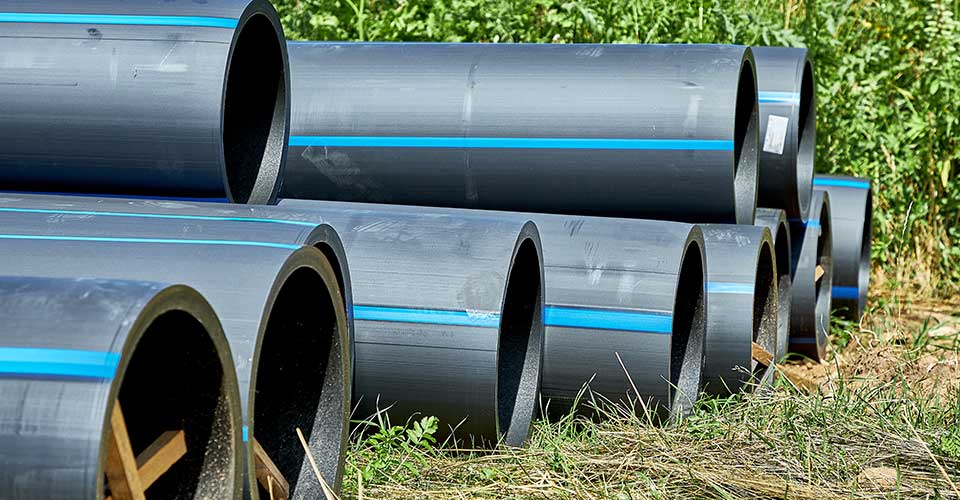hdpe pipe suppliers Midland TX: Checklist for Contractors
Wiki Article
Understanding the Key Conveniences of HDPE Pipeline for Water and Wastewater Administration
The use of HDPE pipeline in water and wastewater monitoring provides countless advantages that warrant consideration. Its remarkable longevity and lengthy life-span make it a favored option for numerous tasks. In addition, the product's resistance to deterioration and chemical damages improves its reliability in various atmospheres. However, the advantages extend beyond just long life and resistance. Exploring its cost-effectiveness and environmental effect reveals much more compelling factors for its widespread fostering in modern-day facilitiesExceptional Durability and Longevity

HDPE pipeline sticks out for its extraordinary longevity and durability, making it a preferred option in water administration systems. Created from high-density polyethylene, these pipes can hold up against substantial stress and stress, guaranteeing trustworthy efficiency gradually. Their robust nature permits them to withstand severe ecological conditions, consisting of temperature level fluctuations and soil motions, which can cause various other materials to fall short.
The life-span of HDPE pipes often exceeds 50 years, offering a cost-efficient remedy for communities and sectors alike. In addition, the product's light-weight properties streamline installment, lowering labor costs and timeframes. This durability lessens the demand for frequent repair services or replacements, better improving its financial appeal.
In water management applications, the integrity of HDPE pipes suggests less disruptions and enhanced service continuity, making them integral to lasting infrastructure advancement. The combination of resilience and long life solidifies HDPE's duty as a foundation in effective water management options.

Resistance to Rust and Chemical Damages
While numerous materials succumb to rust and chemical damage gradually, HDPE pipes exhibit amazing resistance, making them perfect for different water management applications. This resilience comes from the molecular framework of high-density polyethylene, which is naturally non-reactive and does not rust like steels or break down from exposure to harsh chemicals. Because of this, HDPE is very reliable in atmospheres with hostile compounds, such as wastewater systems that might include acids, bases, and natural solvents.
Furthermore, HDPE pipelines can withstand ecological aspects such as soil level of acidity and saline conditions, better boosting their viability for diverse applications (hdpe pipe in stock Midland TX). Their capacity to preserve structural integrity in time minimizes the threat of leaks and failings, which is essential in guaranteeing the safety and dependability of water circulation and wastewater management systems. The resistance to corrosion and chemical damages noticeably contributes to the general effectiveness and long life of HDPE piping options.
Cost-Effectiveness and Financial Benefits
When thinking about the economic implications of water monitoring systems, the cost-effectiveness of HDPE pipes becomes apparent. These pipes supply reduced installment and maintenance expenses contrasted to standard products like metal or concrete. Their lightweight nature streamlines transport and installation, leading to reduced labor expenditures. In addition, HDPE pipelines exhibit a long life-span, commonly surpassing 50 years, which converts to less substitutes and long-lasting financial savings.The resistance of HDPE to corrosion and chemical damages minimizes the demand for costly repair services and substitutes. The pipes likewise support reliable water flow, reducing energy costs associated with pumping systems. By mitigating leaks and water loss, HDPE pipelines add to substantial economic benefits for communities and markets alike. Overall, the first investment in HDPE piping can generate substantial economic returns over the lifespan of the water management system, making it a sensible choice for lasting framework growth.
Ecological Sustainability and Reduced Influence

Versatility and Flexibility in Setup
Because of their distinct residential properties, HDPE pipes supply exceptional convenience and versatility in setup, making them suitable for a large range of applications. Their lightweight nature enables much easier handling and transportation, minimizing labor costs and installation time. HDPE pipes can be bent and shaped to fit numerous terrains and project requirements, copper gas line which is especially valuable in testing environments.Additionally, their resistance to corrosion and chemical damages enables for installation in diverse setups without the requirement for specialized safety coverings. The capacity to fuse joints creates a continual, leak-free system, improving the total integrity and dependability of the installation. HDPE's flexibility likewise suits ground motion, minimizing the risk of damage in areas susceptible to moving soil. Overall, these features make HDPE pipes not only flexible yet additionally a preferred selection for water and wastewater administration systems.
Regularly Asked Inquiries
Just How Does HDPE Pipeline Compare to PVC in Water Administration Applications?
check here HDPE pipe provides premium versatility, resistance to corrosion, and longevity contrasted to PVC. Its lighter weight helps with easier setup, while its long life-span decreases replacement prices, making HDPE a recommended option in water management applications.What Is the Life Expectancy of HDPE Water Lines Under Typical Problems?
Under typical conditions, HDPE pipes can have a life expectancy ranging from 50 to 100 years. Their durability and resistance to corrosion add to their long-term efficiency in various applications, making them a trusted option for facilities.Are HDPE Water Lines Recyclable After Their Solution Life?
Yes, HDPE pipelines are recyclable after their life span. Pipe Supplier American Plastics Midland. They can be refined and repurposed into new products, considerably lowering environmental effect and promoting sustainability within the sector, making them an environment-friendly option for piping optionsWhat Is the Setup Process for HDPE Piping?
The installment procedure for HDPE pipes involves site prep work, trenching, pipeline blend or mechanical joining, backfilling, and stress screening. Proper techniques ensure a resilient and effective system for carrying water and wastewater properly.Can HDPE Piping Be Used for Both Safe And Clean and Non-Potable Water Equipments?
Yes, HDPE pipelines can be made use of for both drinkable and non-potable water supply. Their convenience, longevity, and resistance to deterioration make them appropriate for various applications, making sure safe and efficient transportation of oilfield equipment for sale water in various contexts.Report this wiki page